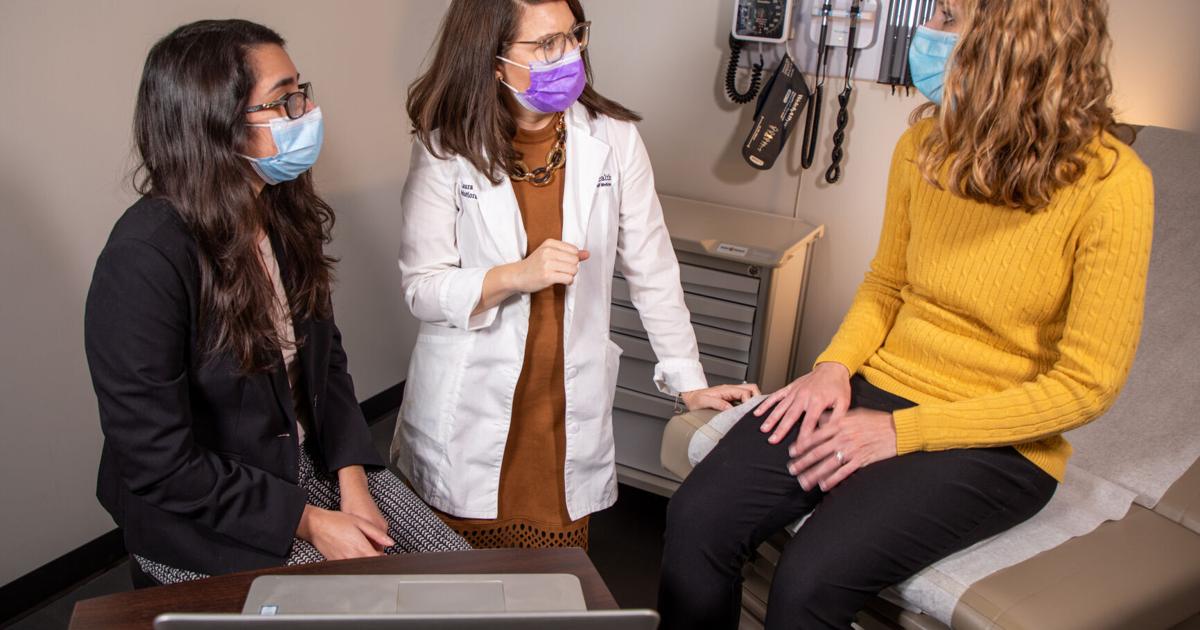Johnson City Press
JOHNSON CITY — When East Tennessee State University recruited Dr. Jodi Polaha to Johnson City in 2006, her work in Nebraska integrating behavioral health services into primary care was a big reason why.
It wasn’t until recently, however, that Polaha and her colleague Dr. Matthew Tolliver began working with an eye toward building a model that could be used across the region and communities across the nation.
Though it’s not necessarily a new idea — having been implemented in several states and cities nationwide — the novel approach to diagnosing and treating mental health conditions earlier by placing behavioral health care providers into primary care settings is one way health care providers can better respond to a worsening mental health crisis.
“If we work the way we normally work as a private practice, psychologists will never be able to keep up with the volume of patients seen in primary care and we really won’t be able to do that gamut of work that we can do in primary care,” Polaha said. “When we’re in primary care, we don’t just see people with major mental health problems. We see people who need to make some lifestyles changes, we see people who maybe were looking at doing some preventative work … which is way better than waiting until a problem pops up.”
A model program in practice
Polaha said the idea was to create and start a model program,the Institute for Integrated Behavioral Health, at ETSU before turning their focus toward helping other primary care clinics across the region integrate behavioral health into their clinics. They’ve already started with a degree of success: In early 2020, before the pandemic, they saw fewer than 100 patients per month, a number that’s now up to nearly 400.
Over the past two years, they’ve placed behavioral health care providers in each of ETSU Health’s primary care clinics, including family medicine, internal medicine, pediatrics and obstetrics and gynecology offices, and recently started placing those providers in ETSU Health’s nurse-managed clinics such as the Johnson City Community Health Center.
Health Center Office Manager Vanessa Smith said integrating behavioral health care is especially important for them because of the population they serve — typically underinsured or uninsured people who may lack reliable transportation to return for multiple appointments.
Smith said the clinic has done traditional one-hour counseling sessions before, but it wasn’t very accessible for everyone because they had a waiting list.
“Being able to kind of remove that traditional way of doing things, and really bringing the integration to the clinics and having this new format just really gives our patients that access that they needed,” Smith said. “Whether it’s 15, 20 minutes or a 30-minute session, it still gives us a chance to touch a lot more patients a day than we could have originally.”
Polaha also said of those who receive referrals to behavioral health clinics, only a small portion actually show up for their visits for a variety of reasons: a lack of reliable transportation, not being seen in a timely manner or a lack of proper insurance.
“What if we can effectively identify the people that can get better with a low dose intervention and primary care, and just offload some of that demand so that the people who really need and want and will follow through with a longer, more intensive course of treatment can just get right in?” said Polaha. “That’s the idea.”
Dr. Jenny Rose, a pediatrician with State of Franklin Healthcare Associates, said they’ve been using an integrated behavioral health model for five years with Polaha and ETSU’s help.
Rose said they have a child psychologist that works in concert with providers to diagnose issues across the age spectrum, whether that’s difficulty potty training or sleep, to more complex issues such as depression and anxiety.
Rose said they typically use what’s called a warm hand-off, where if they recognize a patient may have some sort of behavioral health problem, they’ll leave the room and conference with the behavioral health physician, and then bring them into the visit so the patient sees both doctors at the same time.
“It helps us address issues before they grow into bigger problems,” Rose said. “We really like taking a preventative approach and then it also allows immediate access to patients to, you know, to fit appropriately — we can get them help on the spot, and then we can also help get them the right referrals if they do need a referral outside of what we can manage in our practice.”
Dr. Bill Block, dean of the Quillen College of Medicine, said the integration of behavioral health care into primary care “addresses one of the those things that practicing physicians and patients encounter all the time: you show up at your doctor’s appointment for whatever’s going on from a medical standpoint, but we also are then faced with a behavioral health or psychological” issue.
“This allows us then to help that patient get directly to care that is much more specialized and much more able to deal with that than somebody like myself,” said Block. “I could deliver your baby, but my ability to help you through a stressful psychological time is limited, not only by training, but also by the schedule I’m trying to keep and everything else that’s impacting that.
“If I have somebody like Jodi there — that I’m able to get that patient, really a resource at the right time, there’s really no better way to help the community,” Block continued. “It helps the providers in the clinic, it helps the community — it’s an all-around.”
Building the workforce
Julia Najm, a clinical psychology doctoral student who came to ETSU from Texas because of the Institute for Integrated for Behavioral Health, said the integrated behavioral health care model in ETSU’s clinics has been a valuable experience for her.
“This is a training experience that is unique, that I can then take along for the rest of my life and in my career and then apply it to other clinics that I work in and other professionals that I encounter because it is a mission that I believe in, and I’ve seen first-hand how helpful it is to members of the community, and they deserve something like this,” said Najm.
“And then also being able to work with providers and seeing their confidence grow and being able to address behavioral health problems and how that, overall, impacts the outcomes of their patients is really inspiring to see.”
In 2021, ETSU received a $1.85 million grant from the Health Resources and Services Administration to train 50 students over a five-year period in integrated care — students Polaha said they hope to keep in the region after they graduate as the need for behavioral health providers grows, particularly in rural areas.
“It’s pretty tough to sustain behavioral health services anywhere without having a commensurate training program, without having a commensurate workforce training program,” said Polaha. “I think we’re finding that out across all sectors.”
A growing need
The World Health Organization reported in March that the pandemic has caused a 25% increase in the prevalence of anxiety and depression worldwide, and that young people are at a disproportionately high risk for suicide and self-harm. A study published in the Journal of the American Medical Association in September 2020 found the prevalence of depression symptoms in U.S. adults increased from 8.5% before the pandemic to 27.8% from March 31 to April 13, 2020.
A subsequent study, published in the Lancet Regional Health journal in January, found the prevalence of depression symptoms has continued to increase since the 2020 study, up from 27.8% in March-April 2020 to 32.8% in March-April 2021.
Najm said the increased prevalence of mental health conditions as a result of the pandemic make programs like this both important and timely.
“Being able to have these timely conversations can do wonders in terms of early intervention, so that whatever problem they’re dealing with is not becoming so impactful that it’s even more challenging to get help with,” Najm said.
Caregivers say some of the benefits of behavioral health programs offered alongside primary care doctors are that they more quickly get patients the help they need and destigmatize seeking treatment for mental health issues.
“For a long time we’ve talked about the advantage of primary care-based mental health services as a particular advantage in rural areas because nobody knows you’re there,” Polaha said. “Your car is pulled up in front of the doctor’s office, not in front of a mental health provider, and you’re in there like everybody else that’s just seeing their doctors. And, we really work with our physicians on non-stigmatizing language.”
Rose said they’ve experienced that de-stigmatization first-hand.
“I think as primary care physicians, we kind of bridge that gap for patients,” Rose said, “and having (behavioral health providers) in-house with us really does reduce the stigma and increases, you know, parents and patients’ readiness to accept that help.”


















